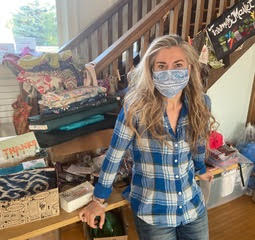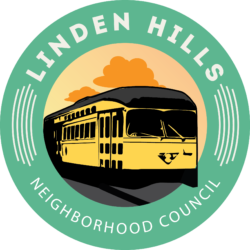
Linden Hills sewing activists make thousands of masks for healthcare providers
By Linda Picone, LHiNC Board Member
The women in Linden Hills who started Boomerang Bags to provide free cloth bags in an effort to reduce the use of non-reusable paper or, worse, plastic, grocery bags did what people and businesses across the spectrum did in the face of COVID-19: They pivoted and changed their operation virtually overnight.
Since early April, the group of “sewing activists” or “sewists” (because “sewers” doesn’t sound good—and looks even worse in print) has been making cloth masks for healthcare professionals and their patients.
As of late August, the sewing activists in Linden Hills and Kingfield had given out 8,500 masks and 500 scrub caps to many of the major hospitals in the area (Abbott Northwestern, Children’s Hospital, Fairview, Park Nicollet, North Memorial, Ridgeview Medical Center); nursing homes (Walker Methodist, Ebenezer Ridges and Presbyterian Homes of Bloomington); tribes, such as Navajo Nation and Minnesota Chippewa; service providers (Emerge, Avivo, St. Stephens, Union Gospel Mission, YMCA); dozens of specialty medical clinics; schools (Bloomington School district, Minneapolis Public Schools); and the Animal Humane Society (for volunteers, not pets!).
Initially, says Felicity Britton, the organizer of Boomerang Bags in Linden Hills, masks were made and provided to frontline healthcare providers, who did not have access to all the personal protective equipment (PPE) they needed to cope with patients and others who might expose them to COVID-19. By mid-summer, however, masks were being distributed to healthcare providers who could offer them to their patients.
The group announced on Facebook that they would be sewing masks and the word spread quickly, Britton says, so there were hundreds of requests almost immediately.
Boomerang Bags Minneapolis started in 2016—the first group in the United States.
Today, there are four Twin Cities groups (Linden Hills and Kingfield neighborhoods in Minneapolis, Richfield and a Metro quilters’ group), plus 60 in the United States and 1,1200 worldwide.
The Linden Hills group had regular sewing get-togethers at Britton’s home. She is active in environmental activities and is a former executive director of Linden Hills Power & Light and board member of Minneapolis Climate Action. The end goal of Boomerang Bags was environmental, but there was more than making bags in the process. “The side effect is that you build community and friendships, and you talk about other environmental things while you’re working together,” Britton says.
The pandemic changed the process as well as the product. Now, people make the masks at home; there are no productive and social get-togethers. Britton fields the requests, packages the masks and organizes the delivery by volunteers. “I’m the logistical hub,” she says. “I don’t sew, but I’m happy to collect, label and distribute.”
Most of the cloth used for the masks has been donated and two small grants from Thrivent Financial paid for the elastics used. Britton says some of the “sewists” are “just like machines,” at least 20 people are consistently producing roughly half a dozen masks each week including one woman who makes 40 masks each week.
Although there are quite a few mask styles, Britton says the group decided early on to stick to two patterns, one from the University of Minnesota and one from Deaconess Hospital. With school starting up and partial in-classroom time for some students, the group is now making some masks in children’s sizes.
If you’re interested in sewing masks, donating fabric, helping with distribution or helping in some other way, go to https://www.mplsclimate.org/mask-information.html.

